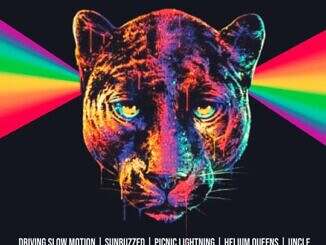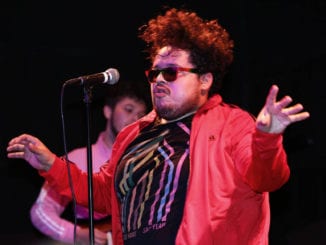Check out more shows @ billybobstexas.com
Dwight Yoakam
Swimmin’ Pools, Movie Stars…
The grass isn’t always greener on the other side, or bluer in this case, which may be why Dwight Yoakam hadn’t thought of doing a bluegrass album over the years. It was always already implicit in his music, from “Miner’s Prayer” on his first album 30 years ago to his one-off collaborations with Ralph Stanley and Earl Scruggs. If you listened hard, you could even hear that strain of mountain music in the melodies and harmonic sense of his most rocked-out country hits. He wasn’t consciously thinking through the years that he could bust out the mandolins to confirm his Kentucky bona fides – “Melodically, it’s just part of my nature,” Yoakam says, “part of the birthright, I guess, in my DNA.”
Yet here he is, releasing Swimmin’ Pools, Movie Stars… in the same year that he is celebrating the 30th anniversary of Guitars, Cadillacs, Etc., Etc.. Swimmin’ Pools, Movie Stars… harks back to that landmark debut in its obviously cheeky title, while otherwise looking even farther back by recasting some of Yoakam’s most classic songs in a style that not only predates cowpunk but antecedes his beloved Bakersfield sound. Yoakam even remakes “Guitars, Cadillacs” in the style of “Man of Constant Sorrow.” No one is ever going to mistake a star so renowned for favoring snug jeans with a Soggy Bottom Boy, but here, he clinches his status as at least an honorary Clinch Mountain lad. “And then Chris Lord-Alge, who has mixed my last 2 studio albums, entered the picture in LA and agreed to add a further edge of Beggars Banquet-esque rock and roll mystique, completing the journey with a masterfully unique sonic framing of the entire project. I believe it was the first bluegrass album that Chris has ever mixed.”
“It was part of Alison Krauss’ Union Station band colliding with the remnants of the Soggy Bottom band,” says Yoakam, talking about the four days of band tracking he did in Nashville and April with a group of acoustic all-stars he’d never worked with before. The ensemble included guitarist Bryan Sutton, fiddler Stuart Duncan, bassist Barry Bales, mandolin player Adam Steffey, and banjo player Scott Vestal, under the production oversight of Gary Paczosa (another Krauss veteran) and Jon Randall (the co-writer of country hits like “Whiskey Lullaby”). “And then I threw, I guess, a hillbilly version of the Beach Boys at it with my harmony vocals. That core bunch of players there in Nashville for those four days was a really fortuitous vortex, with those guys responding to what I wanted to do and me saying, ‘Look, let’s leave it loose and ragged at times.’ Rock and roll got some of its swagger from bluegrass. Let’s go back there and show some of that swagger if we can.”
Swimmin’ Pools, Movie Stars… started as, if not an assignment, at least a suggestion, and one he readily took to once he found the right recording window. “Kevin Welk had asked my managers a couple years ago if I would do a bluegrass album for his then-label Vanguard/Sugar Hill,” Yoakam says. “Subsequently they merged with Concord Music Group, which owned Rounder, and it became that entire music company, and they came back to us again this year. At the first ask, I had been in the middle of doing Second Hand Heart,” his 2015 return to the Warner Bros. Records stable from which he sprang three decades ago. “Cameron Strang, who runs Warners, graciously allowed me to take this year off in terms of delivering my next studio album for them (Warner) to do this project, because he knew it was a passion project for me.”
The original idea was to make it a covers album, before it ended up being an album of Dwight Yoakam covers, with one notable exception – a cover of Prince’s “Purple Rain.” “But when Gary and JR (Randall) came to do a meeting with me, they said, ‘You know, we started listening to your catalog, and we found songs where we thought, “Wow, that was never a single. Nobody ever heard that. Should we do that with him?”’ I let them come to me with titles that they liked. I didn’t really pick; they did. And we ended up with 11 tracks that had been on my earlier albums, but only two of them, ‘Guitars, Cadillacs’ and ‘Please, Please Baby,’ were ever hits. Only one other song had even been a single, ‘These Arms,’ and it didn’t crack the top 30. So I don’t know if ‘obscure’ is the word for these songs —people that had my albums have come across them — but they’re the tracks that were songs less traveled.”
The bluegrass influence “has always kind of been, as Glenn Frey would say, whispering in my other ear,” Yoakam says. Some of the signposts: In 1997, Yoakam recorded a cover of the Clash’s “Train in Vain” with Dr. Ralph Stanley on banjo and harmonies. On the Earl Scruggs and Friendsalbum in 2001, Yoakam co-wrote and sang “Borrowed Love” with another one of the genre’s great banjo players. In the mid-2000s, Yoakam started introducing a bluegrass-style acoustic rave-up mini-set in the middle of his otherwise electrified shows. And it’s been a mutual love affair. The influence he had on bluegrass himself was palpable, most obviously with the release of a Pickin’ on Dwight Yoakam bluegrass tribute album. Just this July, the group Flatt Lonesome was nominated for an International Bluegrass Music Award for Best Song for their cover of Yoakam’s “You’re the One.”
But the seed for Yoakam going a little bit more bluegrass himself, outside the realms of duets and tributes? “In deference to his recent passing, I need to mention that the first person who ever mentioned it to me was Ralph Stanley,” Yoakam says. “In the early ‘90s, I went in and recorded with Ralph around two Neumann microphones with the live bluegrass band that was the Clinch Mountain Boys at that time. He invited me to be his guest on his double album Saturday Night, Sunday Morning. And he looked at me after we finished doing ‘Miner’s Prayer’ and said, ‘Me and the band think you ought to think about being a bluegrass singer.’ I said, ‘Well, I guess my birth certificate gives me some credentials to own the holler that I was living in the first couple years of my life, and musically express that.’ Being born into rural southeast Kentucky there in Pike County, which is just across the Virginia state line from the area of the Clinch Mountains where the Stanley Brothers and the Carter Family came out of, maybe it was inevitable. But, having said that, let’s wait a minute and — wee doggies! – see what we did to it.”
Wee doggies, indeed. The principal tracks for Swimmin’ Pools, Movie Stars… were recorded at Zac Brown’s studio in Nashville, Southern Ground (formerly Fred Foster’s Monument Records home, memorialized in Dave Grohl’s recent documentary visit to the nation’s great recording studios). Later, Yoakam cut vocals at Hollywood’s Capitol Studios, where he’s done most of his albums, as well as the former A&M Records lot (now Henson Studios) and East West (formerly United Western, where Pet Sounds was cut). These are all “very historic” places, but “it wasn’t just for shits and grins. It was for the purpose of gathering the magic out of those rooms.”
In one sense, Yoakam wanted to be as faithful to the original traditions as possible, and in another, to mess with those just a little. “I was very strident about exacting a colloquial expression from the guys when they sang along with me,” he says — and the music reaches its “hardcore” peak when Jonathan Clarke sings a bass background vocal on “Home for Sale.” But a song like “Listen” “lent itself to a moment of departure,” where Yoakam was able to “reinterpret west coast sounds” in the vocal stacking.
“It’s really a composite of disparate elements that coalesce in this,” he says. “Country-rock was born when Chris Hillman, who was a bluegrass mandolin player, took Clarence White, who came out of hardcore bluegrass, into the Byrds’ circle on the album before Sweethearts of the Rodeo. So there’s this west coast bluegrass contingent that still echoes in my head — that whole sort of Byrds/Beach Boys thing colliding with mountain culture.”
That’s where the title comes in. “It’s tongue in cheek,” he says, “because the album started in Nashville, and ended up in… well, you know, California is the place you oughta be!” He might sound Beverly Hillbillies flippant in saying that, but underneath the jibing, there’s a real sense of history in how Yoakam sees California’s role even in bluegrass. “I thought, well, I’m gonna give a wink back to everybody, to Flatt and Scruggs and Jimmy Martin and everybody who came out here. And this album really is that hybrid expression of a journey — and it’s the American journey. It’s the Dust Bowl ‘30s era blowing colloquial music out to California with all the Okie/Arkie/Texan migrants. Folks from Kansas and Nebraska and the plains all ended up out here and brought with ‘em their cultural elements. Without that, you don’t have Buck Owens out here, and you don’t have Merle Haggard, perhaps, in the way that we knew him.” And without them, you certainly don’t have the man many of us consider the reigning king of California country, Dwight Yoakam.
So where does “Purple Rain” fit into that, anyway? It’s the odd song out, certainly, though Yoakam and Prince share something in common as far as having been mentored to some extent by Lenny Waronker at Warner Bros.
“We had finished two days of recording the tracks, and I woke up at the hotel in Nashville and heard the news. I was thinking about him and thinking about how uniquely he impacted the culture, so when I got to the studio and everybody was talking about the shock of it, I said ‘I feel like I want to sing “Purple Rain,”’ because I’ve always felt that was one of the more beautiful melodies. We cut it, and I didn’t think about it again, because I thought the emotion of it just got everybody wanting to express something. I didn’t think it was going to be on the record. But months later, I put it on and realized how those guys really played with their hearts that day. And Lenny Waronker, who signed Prince, came over and said ‘You’ve got to.’ You know, I still remember where I was when I first heard ‘Purple Rain’ on the radio, in my car on Yucca (in Hollywood) — still driving air freight, working on my (independent) EP at the time — right in front of Palermo’s No. 2 around the corner from Capitol. And hearing that come on stopped my in my El Camino right there. That melody was so simplistically haunting — hopefully we did justice to it.”
Whether it’s in purple or blue mode, the new album is “something that I’m really glad I took the time I didn’t have to do,” Yoakam laughs. Simultaneously to working on the album and keeping his usual demanding touring schedule, Yoakam was being attentive to his other career, acting, I’m shooting a TV series called Goliath with Billy Bob Thornton, William Hurt and Maria Bello, from producer David E. Kelley. He’s in seven of the show’s eight episodes, which begin airing on Amazon Oct. 13.
Less demanding was the “bit of mischief” he shared with producer Jack White at the Third Man studios for a 45 rpm single, “Mountain of Love” b/w the Monkees’ “Tomorrow’s Gonna Be Another Day.” That one-off single was recorded and mixed all in one day, as is White’s spontaneous wont.
He says Swimmin’ Pools, Movie Stars… has been gratifying partly “because the songs feel new for me,” and partly because of the proper salute he was finally able to give bluegrass. “I hope we did justice to the legacy of that genre and kept the spirit of reckless abandon,” Yoakam says. “When you look back on the ‘30s and ‘40s, the bluegrassers were considered the wild men in music —Bluegrass was rock and roll, before there was such an animal. Hopefully we have that spirit in this.”
©2019 DWIGHT YOAKAM AND WARNER BROS. RECORDS.
ALL RIGHTS RESERVED | PRIVACY POLICY | TERMS OF USE | AD CHOICES | COOKIE POLICY



